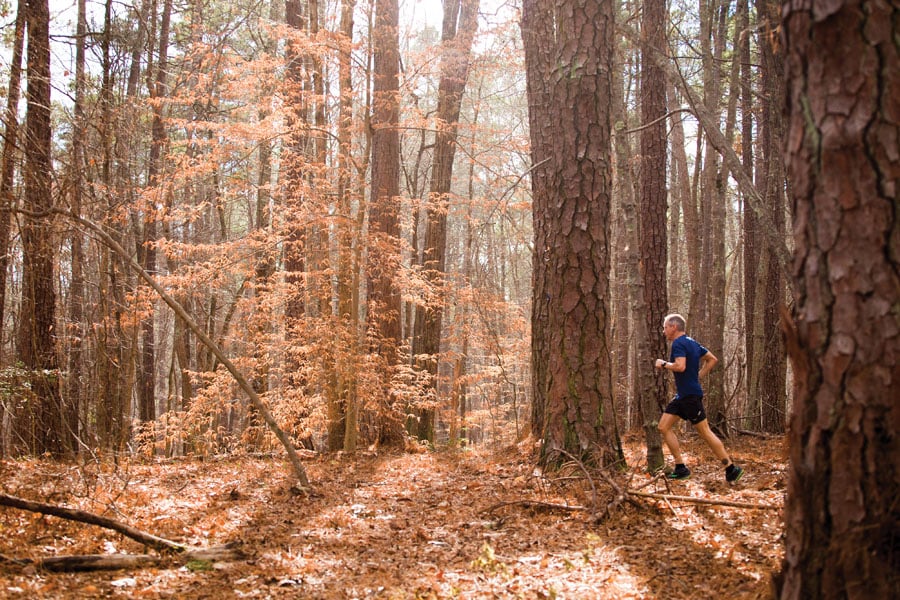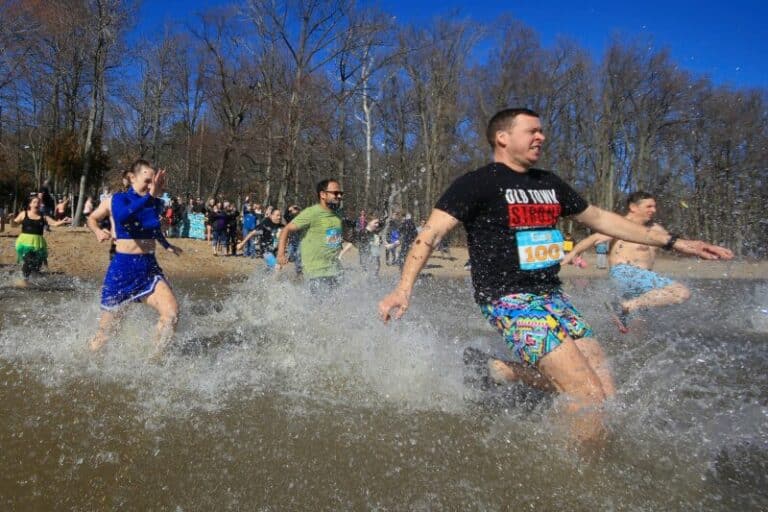It’s late Thursday morning when I arrive at William B. Umstead State Park in Raleigh, N.C. Save for the not-so-distant hum of afternoon traffic blazing down I-40, the parking lot is quiet. Snow lingers in the shadowy crevice of trees, holding on despite the balmy January day.
Charlie Engle parks his Ford Ranger and steps out, shaking his head.
“It figures you’d be the one to be on time, and I’m the one who’s late.”
He smiles broadly through a row of neat white teeth, foregoing a handshake for an embrace. Tall and trim with a headful of closely cropped hair, Engle doesn’t look like a 54-year-old with a history of addiction and an 18-month prison term. His chatter is lively, charming, exuding an almost youthful naiveté. As we walk, he greets every hiker that passes, stooping to dote on the four-legged ones especially.
But behind his cheerful aura, there’s a hint of something darker, a hardened wisdom that comes not from age but from experience. In his debut memoir, Running Man, Engle details that insight, beginning with his early years as an only child and tracing his bumpy, often convoluted ride from addiction to sobriety and, ultimately, ultrarunning.
The memoir is every bit as transparent as Engle, providing a stark and unwavering look at both his accomplishments and shortcomings. After battling an all-consuming addiction to crack cocaine and alcohol for over a decade, Engle turned to running as a form of penance and an avenue for recovery. In the first three years of his running career, Engle ran over 30 marathons.
BRO-TV: Running Man from Blue Ridge Outdoors on Vimeo.
“Nothing else made me feel so clean, so focused, and so happily spent,” he writes in Running Man. “The high that I experienced after a long, hard run—that effervescence of endorphins that had eluded me for so long—was purer and sweeter than any pleasure I had ever felt on drugs. Drugs and alcohol had been my way out. Running would be my way through.”
When marathons lost their edge, Engle sought harder, more daunting challenges. First it was 50-milers, then 100-milers, and eventually multi-day adventure races staged in every corner of the world. From the hills of eastern North Carolina to the rainforest of Brazil, from the volcano-riddled mountains of Ecuador to the barren Gobi Desert of China, Engle followed that running high to its very limits.
After numerous adventure race wins and podiums at notoriously arduous events like the Badwater Ultramarathon, Engle switched gears to take hold of an adventure run of his own design—crossing all 4,500 miles of the Sahara Desert. In 2006, Engle and two fellow runners became the first to successfully make the trans-desert run, an adventure chronicled in the 2007 Matt Damon produced documentary Running the Sahara.
A year later in 2008, Engle embarked on a record attempt across the United States. The run, documented in the film Running America, ended in bitter disappointment after Engle was sidelined on day 20 from a debilitating ankle injury. He completed the trans-America crossing by bike while his fellow teammate Marshall Ulrich continued to run, but relations between the two turned sour. Ulrich finished the run, but failed to set a new record.
That failed attempt would turn out to be the least of Engle’s problems in the years to come. Just one day after the premier of Running America debuted in Greensboro, N.C., six armed federal agents arrested Engle. Charged with allegedly overstating his income on a home loan application, Engle was suddenly thrust into a very different spotlight.
“I was purged from my own life,” he tells me back at Umstead. “My non-profit foundations dropped me, my sponsors dropped me. It hurt my feelings, and it really taught me some painful lessons.”
Engle fought the charges and the paltry evidence stacked against him, but his efforts were in vain. On Valentine’s Day, 2011, Engle arrived at a minimum-security federal prison in Beckley, W.Va., to begin his 21-month sentence. The 18 months that ensued were some of the darkest, most challenging times of his life, harder even than running two marathons a day across the Sahara Desert.
Yet as he sits across from me at a picnic table near his home in Durham, N.C., there’s not a hint of resentment or anger in his voice. Engle’s mastery of finding the silver lining comes through no shortage of reflection, sheer will, and stubborn determination.
“I’m not a person that believes in that old saying, ‘things happen for a reason.’ I don’t buy into that. I think the reason is only revealed once we figure out what we’re going to do with it.”
Let’s back up to your younger years. What is your earliest memory of running?
Being out running in a lightning storm, running around in my cotton underwear and nothing else and there’s lightning all around and my mom is cheering for me on the porch. That kind of freedom, first of all, taught me to love running back when running was all about being a kid. I wasn’t running for any reason other than that’s the natural state of being a kid.
You continued to run throughout your high school years and some into college, but it was during your time at the University of North Carolina at Chapel Hill that your addiction started to manifest itself. How did drugs and alcohol take hold of your life?
I was that kid who played every sport, made good grades, had good SAT scores, volunteered…I was sorta annoyingly overachieving in high school. When I got [to UNC Chapel Hill], lo and behold, I found out that I was actually pretty average. What I found out pretty quickly that I was good at was drinking and partying. I really did get lost and I stayed lost for 10 years of my life.
Did you think you were lost at the time?
I really strived to look good on the outside—be the best salesman at my job, buy a house, buy a car, get married, do all of these things that made me look normal, because my feeling, incorrectly, was that if I looked really normal then I couldn’t possibly be a drug addict and ultimately that’s just not true. My joke used to be that my boss wouldn’t fire the best salesman and that turned out not to be true either.
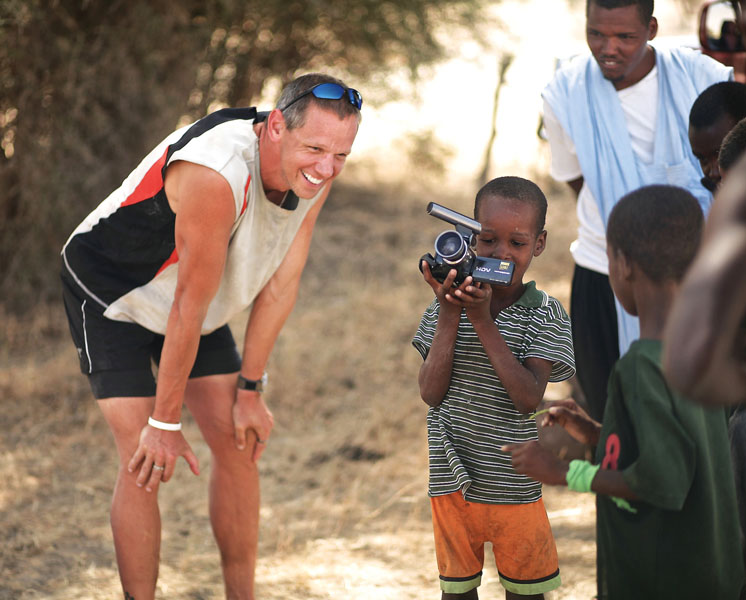
In your memoir, you describe a number of multiday drug binges. Was there any one moment that made you change the downward trajectory your life had been on?
When I was 29 years old, my first son was born, Brett, and I remember really distinctly holding this tiny little baby. I still wasn’t clean and sober, but I vowed that this would be the end of it, like having this person that I was now responsible for other than myself would change everything. In a sense, like he was going to be my savior. Unfortunately nobody else can be your savior other than yourself. My wife and baby came to visit me in Wichita, and I had the best week, literally, of my life. I take them to the airport, I drop them off, and inextricably drive straight to the hood where I spend the next six days drinking and doing drugs. This whole episode ends with the police going through my car and there’s three bullet holes in my car that were put there by somebody trying to do me great harm. I remember it so distinctly, saying to myself, “This seems like a pretty good time to quit.” It sounds simple, and I’m not trying to be flippant, but I realized in that moment that Brett wasn’t going to save me. I changed my life that day. That night I went to a recovery meeting and the next morning I got up and I put my running shoes on.
In your first three years of running regularly, you competed in 30 marathons and some started to question if you had just swapped one addiction for another. How did you respond to that?
If you know someone who is an addict or an alcoholic, the obsession is overwhelming. What people tend not to understand is that every minute of every day of my life as an addict was spent thinking about the next time I was going to drink or do a drug. There was a part of me that worried very much that when I got clean and sober that my life would just be incredibly boring and tedious, like all of my “fun” was over, and that’s the way the addict brain works. What I found was the exact opposite.
What was it in particular about running that resonated with you?
Addiction is all about hiding. It’s about being invisible. Running is the exact opposite. With running, you cannot hide. There is no hiding in a 100-mile race. When you’re in 70 miles and the wheels have come off and you think you are going to die, there’s no hiding. I am the core of who I am in those moments. If I do what I know how to do and push past that and find a way to keep going, it makes me the essence of who I am and that’s the gift in not just running but in all kinds of adventure.
Early on, what role did running play in your recovery?
I had a lot of guilt about my years of addiction because I put people through a lot. When I finally did get sober and I started to use running as a mechanism for my recovery, I felt almost like it was my way of paying my dues, of a penance of sorts, where I punished myself. Really it was the wrong way to go about it, but it was a learning process. It was all about learning how to find a balance between punishing myself for the guilt and shame from my years of addiction and my goal to be better and move forward.
What surprised you the most about this newfound commitment to something other than drugs and alcohol?
The addict in me is actually what makes me good at things. That drive that I have, if it’s focused in the right direction, actually makes me successful.
As the reality of sobriety settled in, what was one of the more noticeable changes in your day-to-day life?
For the first time in my life, I actually got to be present for my own life. Before, as an addict, if I had an emotion—anger, happiness, whatever it was—it was always accompanied by a substance. Now that that crutch was gone, whatever came along, whatever emotion, whatever catastrophe or celebration even, I had to be present for it. I got to be present for it.
What was the biggest lesson you learned from your years of running long-distance races?
Adaptation is the number one most important tool that I have in my opinion. I don’t care if you’re planning a run or a hike, or starting a business or a family, everything is going to go wrong at some point. Who I am is defined by how I react when everything goes completely to hell. Life is easy when everything’s going my way.
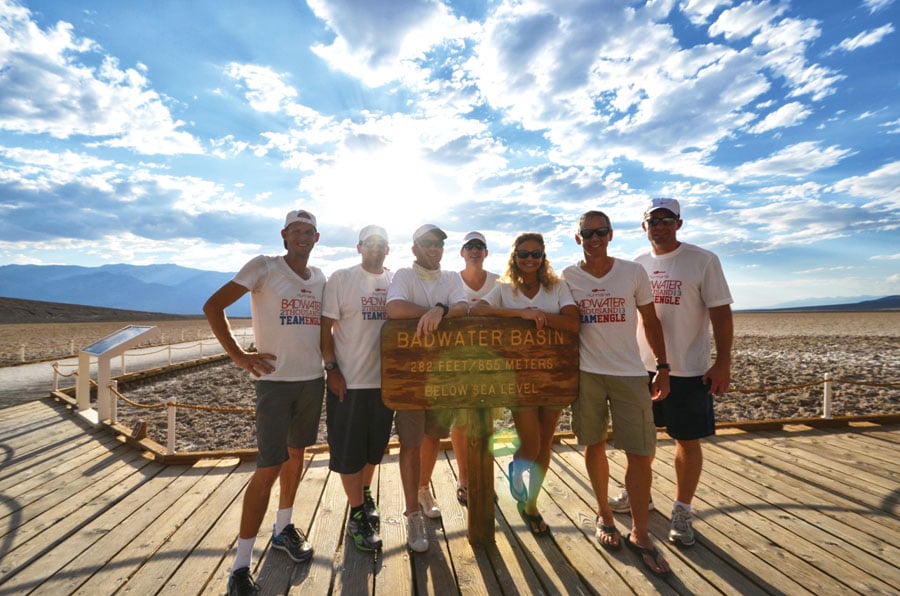
In the early 2001, Ray Zahab, the Canadian runner, brought up the idea of running across the Sahara Desert. How did you respond, and how did that question lead to you and Ray taking on that very challenge?
I literally looked at him and said, “That is the dumbest idea I have ever heard,” but it wouldn’t go away. I went home and it was just stuck there. What I found out was it had indeed never been done, go figure. It intrigued me. I took possession of the possibilities and I let everyone else tell me that it was impossible.
Clearly, you, Ray, and Kevin Lin proved that the impossible was possible in late 2006, but what challenges did the trans-Sahara run encounter along the way?
We had to run 50 miles, almost two marathons, every single day with 130-degree ground temperatures for the first month. It would get cold at night, super hot during the day. We had more problems than I ever could have imagined. That slow-moving train across the Sahara Desert nearly came to a total halt on a number of occasions—we were lost, we ran out of water and food, we weren’t allowed to cross borders, there were tons of physical problems, personalities crashed.
Despite all of that, your team finished. What was running through your head at the end?
I was incredibly sad about it being finished. You’re on this mission for so long and you have this window of time where you’re entirely committed to this one thing, putting one foot in front of the other. Yes, the goal is to finish, but the finishing can be incredibly depressing. I knew there was no recapturing that. I could turn around and run back across the Sahara, but that wouldn’t be the same. You only get to do something for the first time once. The beauty of that run was so powerful for me that I knew instinctively that I’d never get to do that again.
Let’s fast-forward to May 2010. You’ve just been to the premier of your second documentary, Running America, when you’re arrested for allegedly taking a “liar loan.” How did you react to this sudden turn of the table?
It sounds so unreal. I fought it very hard. It was a very expensive undertaking to try to fight it, and I lost. I know it sounds strange, but I was the most qualified person and most well prepared person to go to prison that’s maybe ever gone. I’d been sober for 19 years, I had run all over the world and done some incredibly difficult things, physically, and through all of that, I learned this one basic lesson—it simply doesn’t matter what happens to you in life. All that matters is what you do with it. Good and bad things happen to everybody and they come in different packages. Going to prison meant I had an opportunity, not an opportunity I asked for, or one that I wanted, but it was an opportunity.
How did you spend your time in prison?
I would run, read books, write. I did yoga on the softball field by myself, which I can tell you in prison is a risky thing to do. Thank God I didn’t have spandex.
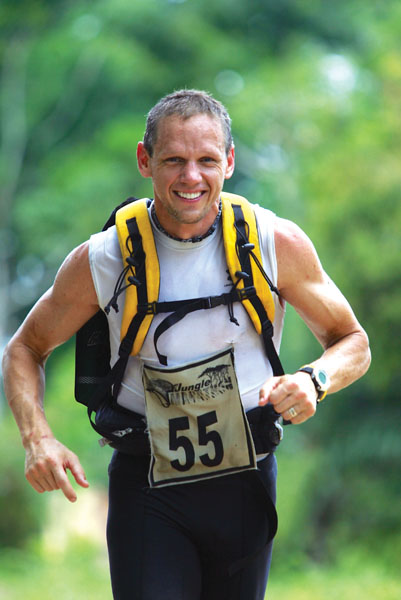
What was the one thing that surprised you about your time in prison?
When I got to Beckley federal prison, there was me and maybe two or three other guys that regularly ran. By the time I left, I had more than 50 guys running in this running group, about 20 guys out doing yoga three days a week on the softball field. We looked ridiculous, but that was some of the best laughter I’ve ever had in my life, and that was a real gift.
During your trial and prison sentence, you and your father worked together to submit a number of appeals, all of which were dismissed on account of technicalities. What was it that eventually made you quit fighting?
If you’re indicted by the federal government in the United States, you’re going down. There’s really no way to beat it. I actually thought the truth mattered, that the facts would speak for themselves and things would change. My friend, who was an attorney, said, “You have to choose—are you going to get on with your life, or are you going to stay mired in this?” It really brought things to light for me. I recognized that unfair and unjust things happen every single day in the world. I’m not saying I’m okay with it. I’m okay with it because there’s no alternative. To dwell on it or somehow deny it is pointless.
What was that first run out of prison like for you?
The day I was released from Beckley, I had to report to a halfway house, but I had enough time to sneak in a brief 30-minute run. I needed to have real running shoes on my feet, I needed to be in woods that weren’t part of a prison complex. I needed those things. I will never forget that feeling of relief. It was almost as if I had been holding my breath for a year and a half and I was finally able to let that out. I felt buoyant.
What role does running serve in your life now?
Running has been a mechanism of exploration for me. I’m not a tourist. I certainly hope I’m not ever going to experience a new place on this earth from the back of a tour bus. That’s not for me. At 54 years old, what it really does is give me urgency. I hope I have 30 more years of this, at least, exploring, but it reminds me that I gotta stay diligent, I need to continue to get out there and see things and running is my way of doing that.
Would you say that running saved your life?
Running saved my life, and then running actually gave me a life, and it’s something I can never repay, and the beautiful part about is I don’t have to. All I have to do is keep running.
